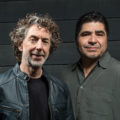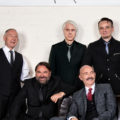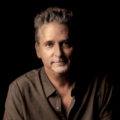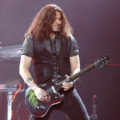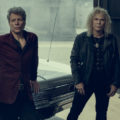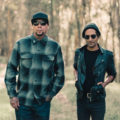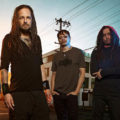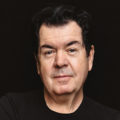Illinois’ own David Hawkins flies higher in Hawk with R.E.M., Hoople, Costello collaborators
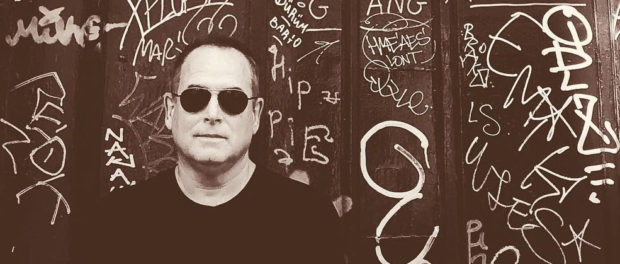 Photos provided by Perpetual Media Relations
Photos provided by Perpetual Media Relations
Garage rock/power pop players Hawk have flown in one format or another across several celebrated long players, but it wasn’t until the brand new album, “Fly,” when the David Hawkins-led act naturally leapt to the next level of supergroup status.
In addition to that Central Illinois-native, the group currently consists of multi-instrumentalist Ken Stringfellow (co-founder of The Posies, a frequent R.E.M. recruit and regular in the Big Star reboot), keyboardist Morgan Fisher (a classic and reunited Mott the Hoople member, plus previous Queen live player), drummer Pete Thomas (a core Elvis Costello & The Attractions contributor) and guitarist Aaron Bakker (from Hawkins’ fellow band Be).
The man who put it all together may now reside in California with the other members scattered all around the globe, but as he tells Chicago Concert Reviews, distance never got in the way of an extroverted artistic vision that was all tied together in the Windy City.
Tell us a bit about your relationship with the other band members and how you got to know them in the first place.
David Hawkins: Ken and I were already recording a lot of material for my other band, Be, and he mentioned he had done a session with Pete, who is one of my favorite drummers of all time, so I asked Pete if he would join us, and he said “yes.” And I’ve known The Jayhawks’ Gary Louris for years, so he joined us for some vocals on “Bomb Pop,” but they were deep into recording their upcoming record, “XOXO,” when we were finishing up “Fly” [so Morgan Fisher is featured in his place]. [Gary] will be joining us on the next Be record as well. I’m thrilled to be playing with these guys. They’re all musical heroes of mine.
 How much do the sounds of Elvis Costello & The Attractions, The Posies/R.E.M. and Mott The Hoople/Queen inform the “Fly” album? Are there any other specific points of reference?
How much do the sounds of Elvis Costello & The Attractions, The Posies/R.E.M. and Mott The Hoople/Queen inform the “Fly” album? Are there any other specific points of reference?
Hawkins: Well, I think they all bring their personal playing styles and musical gifts to the band, so there can’t help but be some influence. And I think on both “Bomb Pop” and “Fly,” my love of power pop and the Wrecking Crew combine with those influences and some harder rock and punk influences too.
Give us a glimpse of any other inspirations from your formative years growing up in Central Illinois.
Hawkins: Well, my brother had this orange mod turntable from Sears and we would rock out to all his records when we were kids. That probably lit the fuse. Neil Young’s “Harvest” was one record that had a huge impact, for sure. The first record I bought myself was Kiss’ “Alive,” and I was a [Bob] Dylan disciple from a young age. Later I got into The Who, [The Rolling] Stones, The Beatles, The Kinks, etc. I was a big [Led] Zeppelin fan too. And then at college, I was a DJ at the college radio station and I got exposed to all the great records from bands like The Clash, The Jam, XTC, The Meat Puppets, Hüsker Dü, and R.E.M., and R.E.M. turned me onto Big Star and The Velvet Underground, two of my biggest influences, so I owe them a triple debt.
What caught your eye about moving to California later in life?
Hawkins: I’ve always loved California for its nature; the old-growth forests, the mountains, the deserts, the ocean. It’s a bounty here, and we definitely take advantage of it.
How did you arrive at the “Fly” title?
Hawkins: It just came to me one day, and it seemed perfect. It felt like we were just gelling as a band and starting to “take off” musically, and it just fit.
What type of subject matter makes its way to the record?
Hawkins: You know, human stuff: Love, yearning, desire, loss, triumph, anger at injustice, encouragement, revolution, celebration; all of the emotions of living through these times. Some are on an individual level, and others on a more collective level.
Describe the process of putting these tracks together at a variety of studios and with some of the players in different places.
 Hawkins: It was a blast. I wrote the songs over a period of time. As Dylan said “I catch them when they come” and then flesh them out. There’s no forcing it. [At first] I recorded them myself with guitar, some keys and vocals. Then we recorded Pete’s drums at the late David Bianco’s studio, Dave’s Room, which is one of Pete’s favorite places to record, and at that point, I did rough mixes and made detailed notes on what each song needs and the style/vibe I was hearing for the arrangements.
Hawkins: It was a blast. I wrote the songs over a period of time. As Dylan said “I catch them when they come” and then flesh them out. There’s no forcing it. [At first] I recorded them myself with guitar, some keys and vocals. Then we recorded Pete’s drums at the late David Bianco’s studio, Dave’s Room, which is one of Pete’s favorite places to record, and at that point, I did rough mixes and made detailed notes on what each song needs and the style/vibe I was hearing for the arrangements.
With those notes in mind, we started overdubbing; more guitars, percussion and keys in Venice, California and Joshua Tree. Ken’s bass, keyboards, guitars and other instruments in Seattle and France. Morgan’s keyboards in Tokyo, all just building the songs up until they felt done. At that point, I re-sang everything until the vocals were finished, which is always the last step in my process before mixing. I mixed with my longtime collaborator, Mike Hagler [Wilco, My Morning Jacket] in Chicago. It was a really fun process, and it was truly an international effort.
Is this strictly a studio endeavor or might live dates follow once it’s possible?
Hawkins: I definitely want to tour when things open back up again. We just have to work around everyone’s schedule.
Tell us a bit about your other bands Be and The Black Mountain Collective.
Hawkins: Well, Hawk is more extroverted and rocking, and Be is more introverted and intimate; more orchestrated. The next Be album is influenced by [The Beach Boys’] “Pet Sounds” and “Smiley Smile”-era Brian Wilson. The one after that will feature the legendary Moroccan band The Master Musicians of Jajouka led by Bachir Attar, who have played with Brian Jones, The Stones, Ornette Coleman, etc. I traveled to their remote mountain village to record with them. It was an incredible experience.
The Black Mountain Collective isn’t a band, but more of an avant-garde arts collective. We do “happenings” inspired by those of John Cage, Merce Cunningham and Robert Rauschenberg in the post-Black Mountain College era in the 1950s, with roots in Dadaist performance.
What prior shows around the area stand out from any aspect of your career?
Hawkins: There was a pivotal show at the Double Door in Chicago that I’ll never forget. We were second on the bill and we kind of stole the show from the headliner, a prominent alt-country band. We just rocked and kind of blew everyone away. It was a blast, and it was that night I knew we’d be playing bigger stages. You could just feel it. But honestly, regardless of any audience response, making music is such a gift in itself; just in the doing of it. I can’t imagine this life without it. I’m really grateful.
For additional information on Hawk, visit HawkMusic.net.

